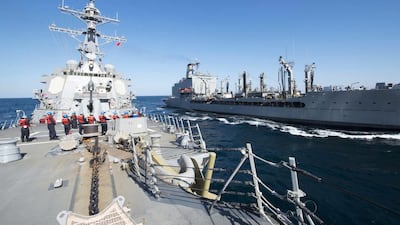TEHRAN // President Hassan Rouhani ordered his defence minister on Thursday to expand Iran’s missile programme, in response to a US threat to impose sanctions over a ballistic missile test Iran carried out in October.
“As the US government is clearly still pursuing its hostile policies and illegal meddling ... the armed forces need to quickly and significantly increase their missile capability,” Mr Rouhani wrote in a letter to defence minister Hossein Dehghan, published on the state news agency IRNA.
US president Barack Obama’s administration is preparing new sanctions against international companies and individuals over Iran’s ballistic missile programme, sources familiar with the situation said on Wednesday.
Meanwhile, an Revolutionary Guard commander on Thursday denied test-firing rockets close to a US aircraft carrier in the Strait of Hormuz.
The Guards’ naval unit is responsible for securing the country’s interests in the vital waterway, regularly patrolling the area and conducting exercises. “The Guards’ naval force had no exercise in the past week when the Americans claim that a missile or rocket was fired in the Hormuz Strait area,” said Gen Ramezan Sharif.
A US military official said on Wednesday that an Iranian vessel had test-fired several rockets near three western warships, including the USS Harry S Truman aircraft carrier last Saturday.
A French frigate and the USS Bulkeley destroyer were also in the area.
Although the rockets were not fired towards any warship, their proximity to the foreign vessels, along with several commercial ships, was “highly provocative”, the official said.
Gen Sharif, however, accused the United States of lying about the incident, which was reported to have occurred after Iranian naval forces announced via radio that the test-firing would occur.
“Publishing such lies in the current situation is more a psychological operation,” he said.
“The security and peace of the Gulf is of serious strategic importance to Iran. The Guard conduct exercises to increase our required preparedness at due times, based on our own schedule.”
Nearly a third of all oil sent by sea passes through the strait, which is located between the UAE, Oman and Iran. The waterway is crucial to vessels taking part in the fight against ISIL in Iraq and Syria.
The incident comes after Iran and US-led world powers agreed a landmark deal to limit Tehran’s nuclear programme in exchange for lifting economic sanctions. While heralded by moderates, such as Iranian president Hassan Rouhani, hardliners denounced the agreement as being against national interests.
Since the July 14 deal, Iran has conducted missile tests criticised by the US. They include a medium-range Emad rocket on October 10 and footage of an underground missile base that was aired on state TV.
On Wednesday, the Wall Street Journal reported that the US was preparing sanctions against about 12 companies and individuals in Iran, Hong Kong and the UAE over alleged links to Iran’s ballistic missile programme.
Such a move by the US treasury would be the first American sanctions against Iran since the nuclear agreement.
Although Iran’s supreme leader Ayatollah Ali Khamenei explicitly endorsed the nuclear accord in October he warned that new sanctions, under any pretext, would constitute a breach.
US officials have said the treasury department retains a right under the nuclear agreement to blacklist Iranian entities suspected of involvement in missile development, the newspaper said.
On Thursday, foreign ministry spokesman Hossein Jaber Ansari said Iran would “respond to any interventionist measure by the US against its defence”, which has no connection to the nuclear agreement.
“Such measures are unilateral, arbitrary and illegal and the Islamic Republic of Iran has warned the United States administration of this,” Mr Ansari said. “No measure can deprive Iran of its legal rights to strengthen its defence and security capability.”
A team of UN sanctions monitors said the medium-range Emad rocket that Iran tested in October was a ballistic missile capable of delivering a nuclear warhead, making it a violation of a UN Security Council resolution.
Ballistic missile tests by Iran are banned under resolution 1929, which dates from 2010 and remains valid until the July nuclear deal between Iran and world powers goes into effect.
Once the deal takes effect, Iran will still be “called upon” not to undertake any ballistic missiles work designed to deliver nuclear weapons for a period of up to eight years, according to a UN Security Council resolution adopted in July after the nuclear deal.
Iran said the resolution would only ban missiles designed to carry a nuclear warhead, not capable of, so it would not affect its military programme as Tehran does not pursue nuclear weapons. Iran has called Emad a conventional missile.
* Agencies

